2023 UCI BRAIN CAMP
By: Morgan Coburn, Ph.D., Assistant Director of Curriculum Development and Instructional Design

Brain Camp participants learn about brain anatomy by dissecting sheep brains.
UCI Brain Camp is a two-week, day-long neuroscience educational opportunity tailored for middle and high school students and is one of only a handful in the world. During their time at Brain Camp, these young neuroscientists delve into a wide range of topics, covering the fundamentals of neuroscience, neuroanatomy, electrophysiology, our senses, memory, sleep, peer review, scientific communication, and the scientific method. The program culminates with campers designing and executing their own experiments and presenting their findings in a poster presentation. In addition, campers tour real neuroscience labs and attend lectures by distinguished UCI faculty members. Campers experienced something truly special at Brain Camp this year. Dr. James McGaugh, a founding faculty member of UC Irvine and a true father of modern neuroscience, generously shared insights about his journey and answered campers’ questions. What’s more? This year, campers enjoyed the experience of dining in a real college dining hall for lunch and no day was complete without the delight of an Otter Pop!
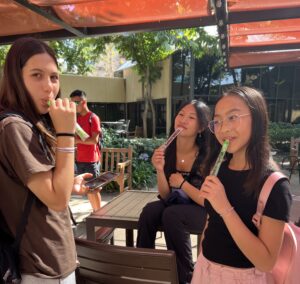
Brain Camp participants enjoy Otter Pops after a day at Brain Camp!
During the first week of Brain Camp, a typical day kicks off with a morning lecture and engaging activity or a visit to a working neuroscience lab, followed by a delicious lunch at Brandywine Dining Hall. After lunch, the afternoon session begins with a discussion to introduce the afternoon’s laboratory activities. Campers then spend the afternoon in the CNLM’s dedicated neuroscience education lab. Here, campers embark on a hands-on exploration of neuroscience concepts. They have the opportunity to explore neuroanatomy by dissecting sheep brains and eyes, learn about neuronal activity by recording from (and stimulating!) a cockroach leg, and observe changes in their heart rate (EKG) during a simulated adrenaline rush induced by immersing their hand in ice. They even record from their own brain’s occipital lobe, learning to differentiate between different types of brain waves in on an EEG.
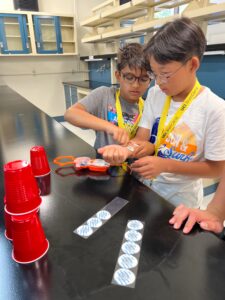
Two middle school students explore how to harness the electrical activity from their own muscles to control a motorized gripper at UCI Brain Camp.
During the second week, afternoons are dedicated to a different focus - designing and executing experiments in small groups. Campers receive dedicated and focused guidance from their science mentors who help them to refine their hypotheses, hone their experimental design, analyze their data, and practice their presentations. Additionally, UCI Brain Campers participate in a unique workshop by science communication expert Bri McWhorter. With a background that includes a theater degree from UC Berkeley and an MFA in acting from UCI, Bri brings a wealth of experience to her workshops and works with thousands of scientists in all career stages around the country. During the workshop, Bri equips our Brain Campers with valuable skills, teaching them how to overcome nerves, plan a compelling presentation, warm up their bodies for effective delivery, and establish a meaningful connection with their audience.
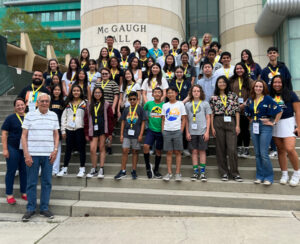
2023 Brain Camp cohort poses in front of McGaugh Hall with Dr. James McGaugh.
We are consistently impressed by the creativity and ingenuity of the experiments devised by Brain Campers. They explore intriguing questions such as: How do changes in heart rate affect working memory? Can different types of music influence performance on a memory test? What’s the impact of specific sounds on high school students’ memory test results? How does music affect our susceptibility to priming? Can we make a cockroach move by sending electricity through its antennas? Does glucose consumption affect short-term memory?
This year’s program was a remarkable success! On the final day of Brain Camp, families were invited to campus where they had the opportunity to witness their campers present their experiments, followed by a celebration featuring cake and a Brain Fest showcasing all the tools and skills mastered throughout the program.
We extend our heartfelt gratitude to all the campers and families who participated in Brain Camp this year, as well as our remarkable team of science mentors, whose invaluable contributions make Brain Camp a reality. This year, we launched the Junior Mentor Program and welcomed back two exceptional alumni from the 2019 and 2021 Brain Camp sessions. Avery Mizrahi and Jay Parikh, who also serve as co-presidents of the Southern California Youth Neuroscience Association (SCYNA), were fantastic instructors! We look forward to future opportunities to invite our alumni back as instructors. To learn more about the UCI CNLM’s neuroscience education programs, please visit our website.
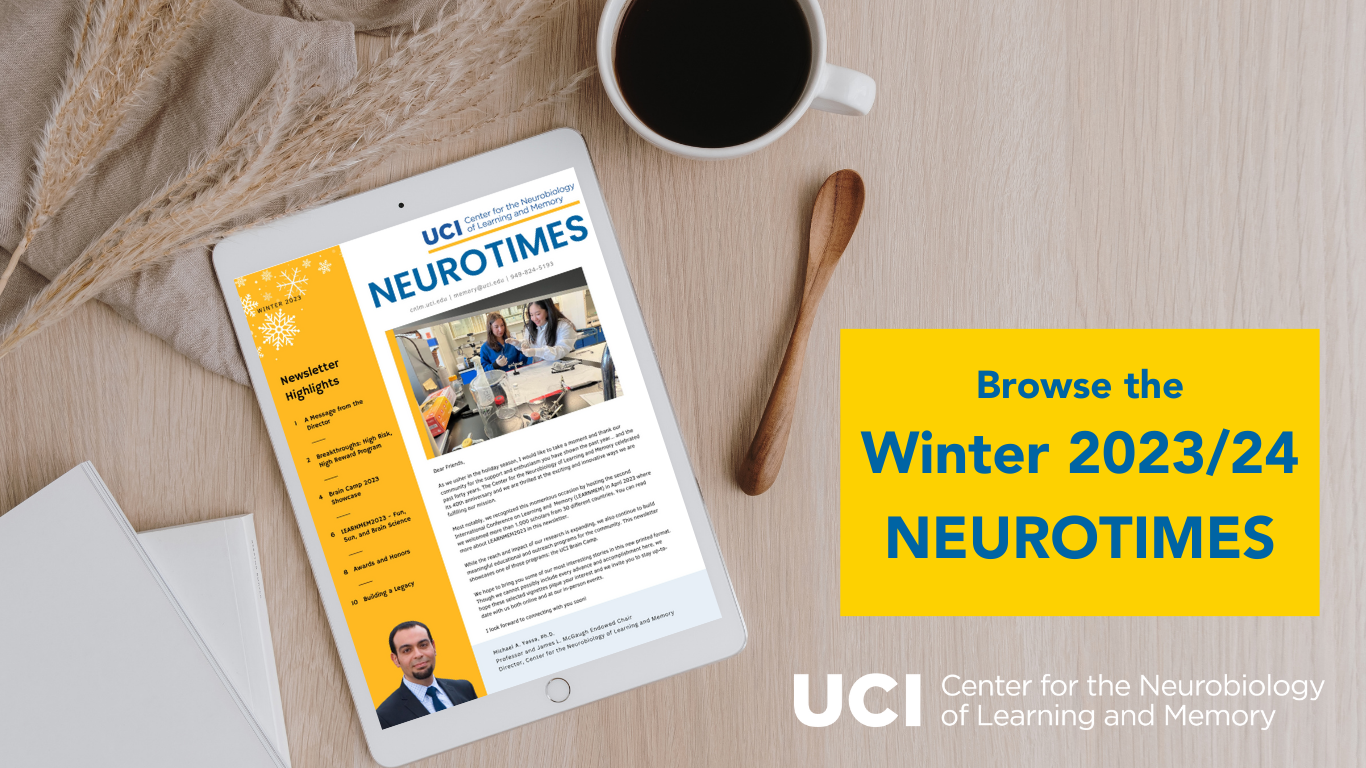
Browse the Winter 2023/24 NeuroTimes
This article was featured in Winter 2023/24 NeuroTimes. You can read the entire edition by clicking on the link below.
>> Read Now
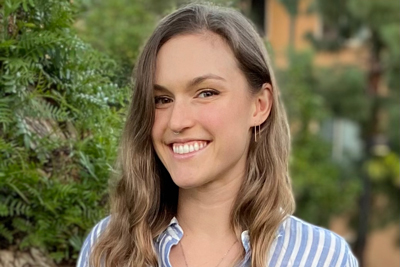
Morgan Coburn, Ph.D.
Morgan is the Outreach and Education Fellow for the CNLM. She received her B.A. from Mount Holyoke College where she majored in Neuroscience and Behavior and Minored in Chemistry. Following undergrad, Morgan earned her PhD in the lab of Dr. Mathew Blurton-Jones at UCI studying human microglial genetics in Alzheimer's disease. As a grad student she was heavily involved with the CNLM Ambassador Program and co-chaired the Brain Explorer Academy Committee, now she works as a fellow on that same program and many other outreach and education efforts through the CNLM. Feel free to ask her about microglia, disability advocacy through art, and all things cats!
